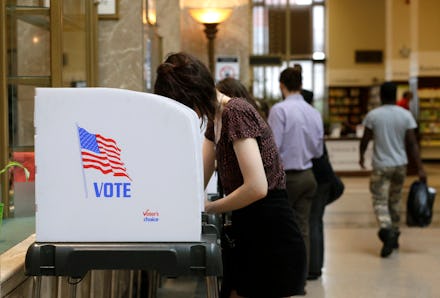There's a New Way to Register to Vote — And It Could Revolutionize American Elections

Debra Cleaver has heard it a thousand times: Young Americans don't vote because they just don't care.
She just doesn't buy it.
"I think that the dominant narrative for years has been that voter turnout is low because Americans are apathetic or disinterested and that is false," Cleaver, a San Francisco tech entrepreneur, said in an interview.
"Voter turnout is historically low because voting is needlessly difficult — and [is] becoming more difficult legislatively."
Read more: New Report Shows Millennial and Minority Voters Face Huge Obstacles at the Polls
With an eye to the byzantine rules regulating U.S. elections, the rising number of states instituting voter ID laws and Americans' increasing attachment to technology, Cleaver is rolling out Vote.org.
The new nonprofit, nonpartisan platform, which officially launches Wednesday, is a streamlined hub that lets users register to vote, request absentee ballots and check their registration status — in any state — in a matter of minutes.
The need for speed (and ease): While candidates like Bernie Sanders have ignited a new interest in politics, young people tend to vote in lower numbers than their older counterparts.
A study released in March as a joint project of New York University School of Law's Brennan Center for Justice and Craig Newmark of craigconnects and craigslist detailed some of the barriers keeping young people from the polls.
Among those facing extra hurdles: College students and low-income people with no permanent address or one that doesn't match the ID they hold, transgender people whose gender identity conflicts with their government ID and people who don't drive and so don't have a license.
Cleaver, 38, puts it bluntly: "We are in the middle of the most significant rollback of voting rights since Jim Crow."
Proponents of regulations such as voter ID laws say they're meant to fight fraud: If you can't open a bank account or get a credit card or board a plane without picture identification, why should voting be different?
Opponents like Cleaver — who previously ran Longdistancevoter.org, a site that facilitated absentee ballot voting — say the real aim is to cut off voting access and disenfranchise major portions of the citizenry.
"So what we have on one side are these undeniable efforts to make voting harder, [and] ]what we are doing at Vote.org is make voting easier by streamlining the process," she said.
"If we see a roadblock, we will build the technology to clear that roadblock."
Ashley Spillane, the former Rock the Vote president who's working with Vote.org, agrees the stakes are high.
"This is the first presidential election in decades that the voting rights act won't be in full effect, so there are people in this country who are trying to make it harder to vote, and our mission is to make it as easy as possible — especially for young people," Spillane, 32, said in an interview ahead of the Wednesday site rollout.
"We're also helping people get their vote in by mobilizing hundreds of thousands of people to early vote by absentee and sending reminders about their deadlines."
Biggest tent: According to the Pew Research Center, the 2016 electorate will be the most diverse in American history. Importantly, Spillane said, Vote.org will ideally open the registration and voting process to a broader swath of the electorate.
"We really wanted the tool to be incredibly accessible to a diverse set of users," she said.
"The millennial generation is the most diverse generation in the history of our country, [but] our government doesn't reflect that right now."
As to the obvious question of how they acquired such a desirable URL, Cleaver says she wishes the story were more dramatic: She did a search, found the domain name owner — "who bought it in 1994, which is a full year before I ever touched the internet, and I was a very early adopter" — and convinced him to sell.
To that point, Cleaver, who hopes 3 million users will visit the site this year and about a quarter will use it to register, get an absentee ballot or check their status, says a site like Vote.org is a natural progression past an outdated mode of electing a government.
The future is now: The long lead times in registration that tripped up even Donald Trump's own children, two of whom ended up not being able to vote for him in the New York primary, are vestiges, she said, of an election system that predated computers.
Bringing voter registration in line with modern technology could disprove the notion that young people and other demographic groups don't vote because they don't care about their civic duty, Cleaver said.
"Where is this millennial who's apathetic? I have never met such a person," she said. "So that's what drives us: Americans want to vote."